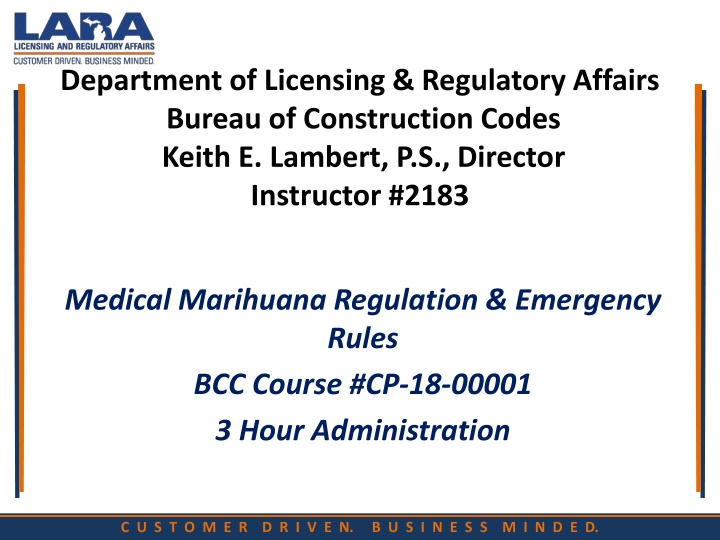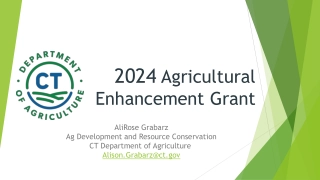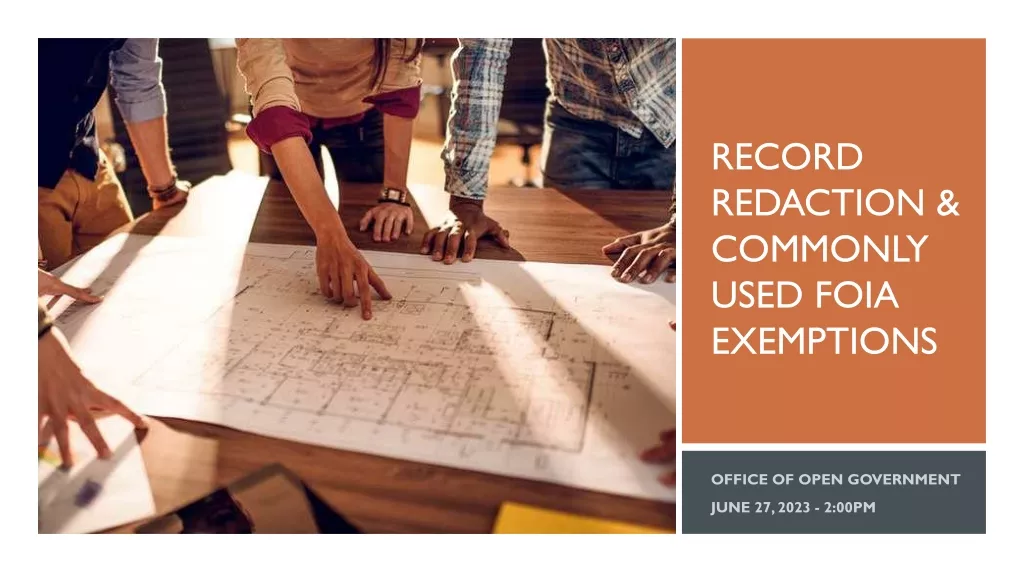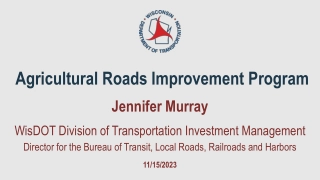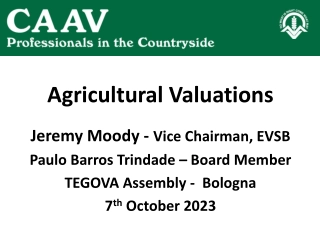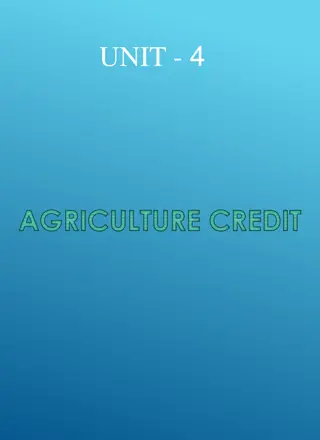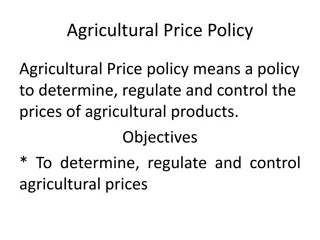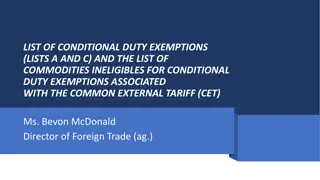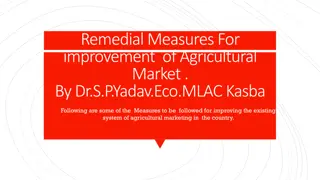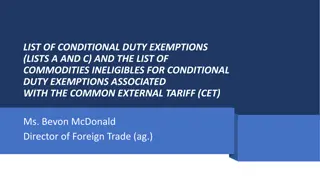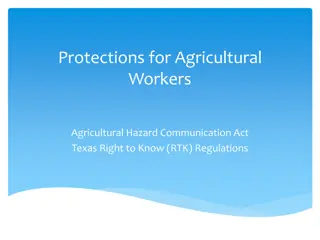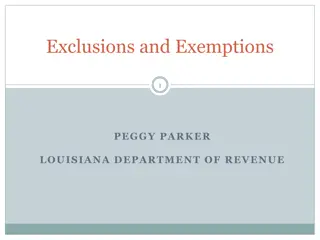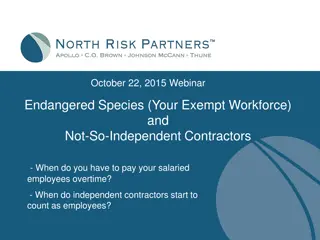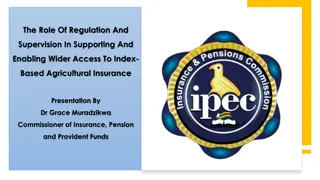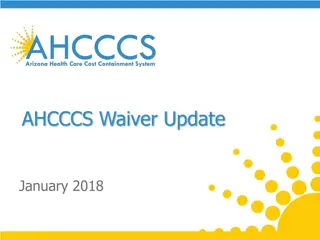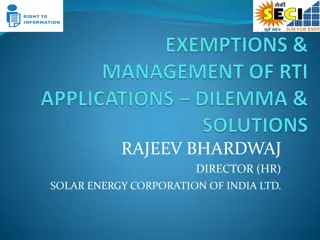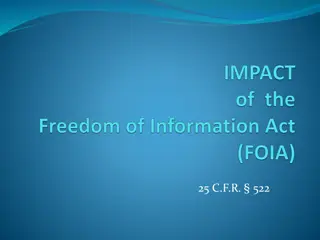Medical Marihuana Regulations and Agricultural Exemptions
This course focuses on the awareness of medical marihuana regulations, agricultural exemptions, zoning ordinances, permits, and certificates of occupancy. It covers key terms, ordinance requirements, license types, emergency rules, and major code requirements related to medical marihuana facilities licensing. Explore definitions of agricultural purposes and products, as well as the Right to Farm Act provisions.
Download Presentation

Please find below an Image/Link to download the presentation.
The content on the website is provided AS IS for your information and personal use only. It may not be sold, licensed, or shared on other websites without obtaining consent from the author.If you encounter any issues during the download, it is possible that the publisher has removed the file from their server.
You are allowed to download the files provided on this website for personal or commercial use, subject to the condition that they are used lawfully. All files are the property of their respective owners.
The content on the website is provided AS IS for your information and personal use only. It may not be sold, licensed, or shared on other websites without obtaining consent from the author.
E N D
Presentation Transcript
Department of Licensing & Regulatory Affairs Bureau of Construction Codes Keith E. Lambert, P.S., Director Instructor #2183 Medical Marihuana Regulation & Emergency Rules BCC Course #CP-18-00001 3 Hour Administration C U S T O M E R D R I V E N. B U S I N E S S M I N D E D.
GOALS 1. 2. AWARENESS OF MEDICAL MARIHUANA REGULATIONS 1972 PA 230 FOCUS ON AGRICULTURAL EXEMPTIONS, ZONING, ORDINANCES, PERMITS, & CERTIFICATES OF OCCUPANCY 2016 PA 281 FOCUS ON KEY TERMS, ORDINANCE REQUIREMENTS, & LICENSE TYPES EMERGENCY RULES FOR THE MEDICAL MARIHUANA FACILITIES LICENSING ACT AWARENESS, CONCERNS, ISSUES, MAJOR CODE REQUIREMENTS REGARDING THE VARIOUS FACILITIES Q & A 3. 4. 5. 6. C U S T O M E R D R I V E N. B U S I N E S S M I N D E D.
1972 PA 230 (Ag) MCL 125.1502a(1) (a) "Agricultural or agricultural purposes" means of, or pertaining to, or connected with, or engaged in agriculture or tillage that is characterized by the act or business of cultivating or using land and soil for the production of crops for the use of animals or humans, and includes, but is not limited to, purposes related to agriculture, farming, dairying, pasturage, horticulture, floriculture, viticulture, and animal and poultry husbandry. (b) "Agricultural product" means a farm product as defined in section 2 of the Michigan right to farm act,1981 PA 93, MCL 286.472. C U S T O M E R D R I V E N. B U S I N E S S M I N D E D.
RIGHT TO FARM ACT (Ag) MCL 286.472 (c) Farm product means those plants and animals useful to human beings produced by agriculture and includes, but is not limited to, forages and sod crops, grains and feed crops, field crops, dairy and dairy products, poultry and poultry products, cervidae, livestock, including breeding and grazing, equine, fish, and other aquacultural products, bees and bee products, berries, herbs, fruits, vegetables, flowers, seeds, grasses, nursery stock, trees and tree products, mushrooms, and other similar products, or any other product which incorporates the use of food, feed, fiber, or fur, as determined by the Michigan commission of agriculture. C U S T O M E R D R I V E N. B U S I N E S S M I N D E D.
1972 PA 230 (Ag & Zoning) MCL 125.1502a(1) (g) "Building" means a combination of materials, whether portable or fixed, forming a structure affording a facility or shelter for use or occupancy by individuals, animals, or property. Building does not include a building, whether temporary or permanent, incidental to the use for agricultural purposes of the land on which the building is located if it is not used in the business of retail trade. Building includes a part or parts of the building and all equipment in the building unless the context clearly requires a different meaning. (o) Construction regulation does not include a zoning ordinance or rule issued pursuant to a zoning ordinance and related to zoning. C U S T O M E R D R I V E N. B U S I N E S S M I N D E D.
1972 PA 230, MCL 125.1502a (cont.) (x) "Other laws and ordinances" means other laws and ordinances whether enacted by this state or by a county, city, village, or township and the rules issued under those laws and ordinances. (bb) "Structure" means that which is built or constructed, an edifice or building of any kind, or a piece of work artificially built up or composed of parts joined together in some definite manner. Structure does not include a structure incident to the use for agricultural purposes of the land on which the structure is located and does not include works of heavy civil construction including, but not limited to, a highway, bridge, dam, reservoir, lock, mine, harbor, dockside port facility, an airport landing facility and facilities for the generation, transmission, or distribution of electricity. Structure includes a part or parts of the structure and all equipment in the structure unless the context clearly requires a different meaning. C U S T O M E R D R I V E N. B U S I N E S S M I N D E D.
1972 PA 230 (Ag) MCL 125.1510 (8) A building permit is not required for a building incidental to the use for agricultural purposes of the land on which the building is located if the building is not used in the business of retail trade. C U S T O M E R D R I V E N. B U S I N E S S M I N D E D.
1972 PA 230 (Ord & Permit) MCL 125.1511 If the application conforms to this act, the code and the requirements of other applicable laws and ordinances, the enforcing agency shall approve the application and issue a building permit to the applicant. Except as otherwise provided in this act or the code, the construction or alteration of a building or structure shall not be commenced until a building permit has been issued. C U S T O M E R D R I V E N. B U S I N E S S M I N D E D.
1972 PA 230 (Ord & Permit) MCL 125.1512 An enforcing agency shall periodically inspect all construction undertaken pursuant to a building permit issued by it to insure that the construction is performed in accordance with conditions of the building permit and is consistent with requirements of the code and other applicable laws and ordinances. An inspection pursuant to this section shall be solely for purposes of enforcing this act and other laws and ordinances related to construction of buildings and structures. C U S T O M E R D R I V E N. B U S I N E S S M I N D E D.
1972 PA 230 (Ord & Permit) MCL 125.1512 A person other than the owner, his agent, architect, engineer or builder shall not accompany an inspector or team of inspectors on an inspection, unless his presence is necessary for the enforcement of this act, or other laws and ordinances related to construction of the building or structure, or except with the consent of an owner, or his agent, architect, engineer or builder. C U S T O M E R D R I V E N. B U S I N E S S M I N D E D.
1972 PA 230 (Ord & Permit) MCL 125.1512 If construction is being undertaken contrary to a building permit, this act, or other applicable laws or ordinances, the enforcing agency shall give written notice to the holder of the building permit, or if a permit has not been issued then to the person doing the construction, notifying him of the violation of this act, or other applicable laws and ordinances, and to appear and show cause why the construction should not be stopped. C U S T O M E R D R I V E N. B U S I N E S S M I N D E D.
1972 PA 230 (Ord & Permit) MCL 125.1512 Without limitation on other available remedies, an interested person may apply for an order, enjoining the continuation of construction undertaken in violation of a building permit, this act, the code or other applicable laws or ordinances, to the circuit court for the county in which the premises are located. C U S T O M E R D R I V E N. B U S I N E S S M I N D E D.
1972 PA 230 (Occupancy) MCL 125.1513 A building or structure hereafter constructed shall not be used or occupied in whole or in part until a certificate of use and occupancy has been issued by the appropriate enforcing agency. The certificate of use and occupancy shall certify that the building or structure has been constructed in accordance with the building permit, the code and other applicable laws and ordinances. C U S T O M E R D R I V E N. B U S I N E S S M I N D E D.
1972 PA 230 (Occupancy) MCL 125.1513 A certificate of use and occupancy shall be issued by the enforcing agency when the work covered by a building permit has been completed in accordance with the permit, the code and other applicable laws and ordinances. On request of a holder of a building permit the enforcing agency may issue a temporary certificate of use and occupancy for a building or structure, or part thereof, before the entire work covered by the building permit has been completed, if the parts of the building or structure to be covered by the certificate may be occupied before completion of all the work in accordance with the permit, the code and other applicable laws and ordinances, without endangering the health or safety of the occupants or users. C U S T O M E R D R I V E N. B U S I N E S S M I N D E D.
2016 PA 281 (Key Terms) MCL 333.27102 (f) "Grower" means a licensee that is a commercial entity located in this state that cultivates, dries, trims, or cures and packages marihuana for sale to a processor or provisioning center. (i) "Marihuana facility" means a location at which a license holder is licensed to operate under this act. (q) "Processor" means a licensee that is a commercial entity located in this state that purchases marihuana from a grower and that extracts resin from the marihuana or creates a marihuana-infused product for sale and transfer in packaged form to a provisioning center. C U S T O M E R D R I V E N. B U S I N E S S M I N D E D.
2016 PA 281 (Key Terms) MCL 333.27102 (r) "Provisioning center" means a licensee that is a commercial entity located in this state that purchases marihuana from a grower or processor and sells, supplies, or provides marihuana to registered qualifying patients, directly or through the patients' registered primary caregivers. Provisioning center includes any commercial property where marihuana is sold at retail to registered qualifying patients or registered primary caregivers. A noncommercial location used by a primary caregiver to assist a qualifying patient connected to the caregiver through the department's marihuana registration process in accordance with the Michigan medical marihuana act is not a provisioning center for purposes of this act. C U S T O M E R D R I V E N. B U S I N E S S M I N D E D.
2016 PA 281 (Key Terms) MCL 333.27102 (w) "Safety compliance facility" means a licensee that is a commercial entity that receives marihuana from a marihuana facility or registered primary caregiver, tests it for contaminants and for tetrahydrocannabinol and other cannabinoids, returns the test results, and may return the marihuana to the marihuana facility. (x) "Secure transporter" means a licensee that is a commercial entity located in this state that stores marihuana and transports marihuana between marihuana facilities for a fee. C U S T O M E R D R I V E N. B U S I N E S S M I N D E D.
2016 PA 281 (Key Terms) MCL 333.27102 (y) "State operating license" or, unless the context requires a different meaning, "license" means a license that is issued under this act that allows the licensee to operate as 1 of the following, specified in the license: (i) A grower. (ii) A processor. (iii) A secure transporter. (iv) A provisioning center. (v) A safety compliance facility. C U S T O M E R D R I V E N. B U S I N E S S M I N D E D.
2016 PA 281 (Ordinance Required) MCL 333.27205 (1) A marihuana facility shall not operate in a municipality unless the municipality has adopted an ordinance that authorizes that type of facility. A municipality may adopt an ordinance to authorize 1 or more types of marihuana facilities within its boundaries and to limit the number of each type of marihuana facility. A municipality may adopt other ordinances relating to marihuana facilities within its jurisdiction, including zoning regulations, but shall not impose regulations regarding the purity or pricing of marihuana or interfering or conflicting with statutory regulations for licensing marihuana facilities. A municipality shall provide the following information to the board within 90 days after the municipality receives notification from the applicant that he or she has applied for a license under this act: C U S T O M E R D R I V E N. B U S I N E S S M I N D E D.
2016 PA 281 (Ordinance Required) MCL 333.27205 (a) A copy of the local ordinance that authorizes the marihuana facility. (b) A copy of any zoning regulations that apply to the proposed marihuana facility within the municipality. (c) A description of any violation of the local ordinance or zoning regulations included under subdivision (a) or (b) committed by the applicant, but only if those violations relate to activities licensed under this act or the Michigan medical marihuana act. C U S T O M E R D R I V E N. B U S I N E S S M I N D E D.
2016 PA 281 (License Application) MCL 333.27401 (1) Beginning 360 days after the effective date of this act, a person may apply to the board for state operating licenses in the categories of class A, B, or C grower; processor; provisioning center; secure transporter; and safety compliance facility as provided in this act. Effective Date of Act December 20, 2016 C U S T O M E R D R I V E N. B U S I N E S S M I N D E D.
2016 PA 281 (License Application) MCL 333.27401 (6) By 10 days after the date the applicant submits an application to the board, the applicant shall notify the municipality by registered mail that it has applied for a license under this act. Municipality will have documentation on file (typically filed with clerk s office) C U S T O M E R D R I V E N. B U S I N E S S M I N D E D.
2016 PA 281 (License Application) MCL 333.27401 Bureau of Medical Marihuana Regulation (BMMR) began accepting applications on December 15, 2017. Applications can be submitted in person or on-line. It is anticipated that decisions on applications will take place sometime in early Spring. C U S T O M E R D R I V E N. B U S I N E S S M I N D E D.
2016 PA 281 (Grower License) MCL 333.27501 (1) A grower license authorizes the grower to grow not more than the following number of marihuana plants under the indicated license class for each license the grower holds in that class: (a) Class A 500 marihuana plants. (b) Class B 1,000 marihuana plants. (c) Class C 1,500 marihuana plants. (7) A grower license does not authorize the grower to operate in an area unless the area is zoned for industrial or agricultural uses or is unzoned and otherwise meets the requirements established in section 205(1). C U S T O M E R D R I V E N. B U S I N E S S M I N D E D.
Emergency Rules Rules became effective on December 4, 2017 and remain in effect for 6 months. Rule 1. Definitions (3) "Building" means a combination of materials forming a structure affording a facility or shelter for use or occupancy by individuals or property. Building includes a part or parts of the building and all equipment in the building. A building shall not be construed to mean a building incidental to the use for agricultural purposes of the land on which the building is located. C U S T O M E R D R I V E N. B U S I N E S S M I N D E D.
Emergency Rules Rule 6. Application requirements ; complete application (1) A complete application for a state operating license must include all the information in Rule 5 and all the following: (b) A copy of the proposed marihuana facility plan under Rule 8. (c) An applicant shall pass the pre-licensure inspection as provided in Rule 9. C U S T O M E R D R I V E N. B U S I N E S S M I N D E D.
Emergency Rules Rule 8. Marihuana facility plan. (2) The marihuana facility plan shall include, but not be limited to, the following: (b) Diagram of the marihuana facility including, but not limited to, its size and dimensions; specifications; physical address; location of common entryways, doorways, or passageways; means of public entry or exit; limited-access areas within the marihuana facility; and indication of the distinct areas or structures at a same location as provided for in Rule 24. (c) Floor plan and layout, including dimensions, maximum storage capabilities, number of rooms, dividing structures, fire walls, and entrances and exits. C U S T O M E R D R I V E N. B U S I N E S S M I N D E D.
Emergency Rules Rule 8. Marihuana facility plan. (2) The marihuana facility plan shall include, but not be limited to, the following: (d) Means of egress, including, but not limited to, delivery and transfer points. (e) Construction details for structures and fire-rated construction for required walls. (f) Building structure information, including but not limited to, new, pre-existing, free-standing, or fixed. Building type information, including but not limited to, commercial, warehouse, industrial, retail, converted property, house, building, mercantile building, pole barn, greenhouse, laboratory, or center. C U S T O M E R D R I V E N. B U S I N E S S M I N D E D.
Emergency Rules Rule 9. Pre-licensure investigation and proposed marihuana facility inspection. (5) An applicant shall submit proof to the department of the following: (a) A certificate of use and occupancy as required pursuant to section 13 of 1972 PA 230, MCL 125.1513 and these rules. C U S T O M E R D R I V E N. B U S I N E S S M I N D E D.
Emergency Rules Rule 24. Operation at a same location grower, processor, and provisioning center. (1) Any combination of the following types of state operating licenses may operate as separate marihuana facilities at the same location: An applicant shall submit proof to the department of the following: (a) A grower. (b) A processor. (c) A provisioning center. C U S T O M E R D R I V E N. B U S I N E S S M I N D E D.
Emergency Rules Rule 24. Operation at a same location grower, processor, and provisioning center. (2) To operate at a same location subject to subrule (1) of this rule all the following apply: (e) Additional inspections and permits may be required for local or state building inspection, fire safety, and public health standards. C U S T O M E R D R I V E N. B U S I N E S S M I N D E D.
Emergency Rules Rule 25. Marihuana facilities; requirements. (1) To ensure the safety, security, and integrity of the operation of marihuana facilities a grower shall operate at a marihuana facility under either of the following conditions: (a) The marihuana facility operations are within a building that meets the security requirements and passes the inspections in these rules and has a building permit pursuant to Rule 26 and these rules. C U S T O M E R D R I V E N. B U S I N E S S M I N D E D.
Emergency Rules Rule 26. Building and fire safety. (1) An applicant's proposed marihuana facility or a licensee's marihuana facility may be subject to inspection by a state building code official, state fire official, or code enforcement official to confirm that no health or safety concerns are present. (2) The department or its authorized agents, state building code official, or his or her authorized designee may conduct pre-licensure and post-licensure inspections to ensure that applicants and licensees comply with the Stille-DeRossett- Hale single state construction code act, 1972 PA 230, MCL 125.1501 to 125.1531. C U S T O M E R D R I V E N. B U S I N E S S M I N D E D.
Emergency Rules Rule 26. Building and fire safety. (3) An applicant or licensee shall not operate a marihuana facility unless a permanent certificate of occupancy has been issued by the appropriate enforcing agency. Prior to a certificate of occupancy being issued work must be completed in accordance with the Stille-DeRossett-Hale single state construction code act, 1972 PA 230, MCL 125.1501 to 125.1531. All of the following apply: C U S T O M E R D R I V E N. B U S I N E S S M I N D E D.
Emergency Rules Rule 26. Building and fire safety. (3)(a) An applicant or licensee shall obtain a building permit for any building utilized as a proposed marihuana facility or marihuana facility as provided in the act and these rules. The issuance, enforcement, and inspection of building permits under this act may remain with the governmental entity having jurisdiction under 1972 PA 230, MCL 125.1501 to 125.1531. C U S T O M E R D R I V E N. B U S I N E S S M I N D E D.
Emergency Rules Rule 26. Building and fire safety. (3)(b) An applicant or licensee shall obtain a building permit for a change of occupancy for an existing building to be utilized as a proposed marihuana facility or marihuana facility as provided in the act and these rules. C U S T O M E R D R I V E N. B U S I N E S S M I N D E D.
Emergency Rules Rule 26. Building and fire safety. (4) An applicant or licensee shall not operate a marihuana facility unless the proposed marihuana facility or marihuana facility has passed prelicensure fire safety inspection by the Bureau of Fire Services (BFS). The department or its authorized agents, or state fire marshal or his or her authorized designee, may conduct pre- licensure and post-licensure inspections of a marihuana facility. An applicant or licensee shall comply with the following: C U S T O M E R D R I V E N. B U S I N E S S M I N D E D.
Emergency Rules Rule 26. Building and fire safety. (4)(c) For specific installation or systems, BFS may require facilities to obtain construction permits, including but not limited to, building construction, electrical, mechanical, compressed gases, flammable and combustible liquids, hazardous materials, LP gas, automatic fire extinguishing/suppression systems, fire alarm and detections systems, and related equipment found during fire safety inspections. C U S T O M E R D R I V E N. B U S I N E S S M I N D E D.
Emergency Rules Rule 26. Building and fire safety. (5) The department or its authorized agents, or state fire marshal or his or her authorized designee, may conduct a BFS fire safety inspection of marihuana facility, at any reasonable time to ensure compliance with the national fire protection association (NFPA) standard 1, 2018 edition, entitled "fire code," which is adopted by reference as part of these rules. A licensee shall comply with the NFPA 1, 2018 fire code as adopted and the following additional requirements: C U S T O M E R D R I V E N. B U S I N E S S M I N D E D.
Emergency Rules Rule 26. Building and fire safety. (5)(c) Processors, growers, and safety compliance facilities shall implement appropriate exhaust ventilation systems to mitigate noxious gasses or other fumes used or created as part of any production process or operations. Exhaust ventilation equipment must be appropriate for the hazard involved and must comply with local fire code and Michigan mechanical codes. C U S T O M E R D R I V E N. B U S I N E S S M I N D E D.
Emergency Rules Rule 26. Building and fire safety. (6) In addition to meeting all the requirements in subrules (1) to (4) of this rule, growers and processors shall also comply with the following: (c) For extractions using compressed gases of varying materials including, but not limited to, butane, propane, and carbon dioxide that are used in multiple processes in cultivation or extraction the following must be met: (i) Flammable gases of varying materials may be used in multiple processes in cultivation or extraction and must meet the requirements in NFPA 90 A, NFPA 58, Appendix B of NFPA 58, NFP A 70 and the applicable parts of the international fuel gas code. C U S T O M E R D R I V E N. B U S I N E S S M I N D E D.
Emergency Rules Rule 26. Building and fire safety. (6)(c) For extractions using compressed gases of varying materials including, but not limited to, butane, propane, and carbon dioxide that are used in multiple processes in cultivation or extraction the following must be met: (ii) Processes that extract oil from marihuana plants and marihuana products using flammable gas or flammable liquid must have leak and/or gas detection measures. All equipment used in the detection of flammable and/or toxic gases must be approved by the BFS and may require construction and mechanical permits. (iii) Marihuana facilities that have exhaust systems are regulated by NFPA 45, NFPA 91 and the applicable parts of the Michigan mechanical code. C U S T O M E R D R I V E N. B U S I N E S S M I N D E D.
Construction Perspective Awareness Types of Facilities Occupancies (Use Groups) Building Code Issues Energy Code Issues Plumbing Code Issues Mechanical Code Issues Electrical Code Issues C U S T O M E R D R I V E N. B U S I N E S S M I N D E D.
Construction Perspective Awareness Local Governmental Subdivision Matters City/Village/Township Councils & Boards Politics versus Business Proximity to sensitive uses Zoning Ordinances & Rules Odor Issues Negative neighborhood perceptions Crime (Security of operations) C U S T O M E R D R I V E N. B U S I N E S S M I N D E D.
Provisioning Center (Dispensary) Stand alone retail shops Group M Occupancy Means of Egress Ventilation & Odors Security Vulnerable uses Comparable to Liquor Stores C U S T O M E R D R I V E N. B U S I N E S S M I N D E D.
Provisioning Center (Dispensary) Generally M occupancy, with exception of a B occupancy component if patients are seen at the facility SECTION 309 MERCANTILE GROUP M 309.1 Mercantile Group M. Mercantile Group M occupancy includes, among others, the use of a building or structure or a portion thereof for the display and sale of merchandise, and involves stocks of goods, wares or merchandise incidental to such purposes and accessible to the public. C U S T O M E R D R I V E N. B U S I N E S S M I N D E D.
Grower (Cultivation) Sites that are solely cultivation facilities are generally a F Occupancy High Tech Facilities Very controlled environments Temperature & Humidity Ventilation & Odors CO2 Enrichment? Low occupant loads Mad science C U S T O M E R D R I V E N. B U S I N E S S M I N D E D.
Grower (Cultivation) SECTION 306 FACTORY GROUP F 306.1 Factory Industrial Group F. Factory Industrial Group F occupancy includes, among others, the use of a building or structure, or a portion thereof, for assembling, disassembling, fabricating, finishing, manufacturing, packaging, repair or processing operations that are not classified as a Group H hazardous or Group S storage occupancy. C U S T O M E R D R I V E N. B U S I N E S S M I N D E D.
Grower (Cultivation) SECTION 312 UTILITY AND MISCELLANEOUS GROUP U 312.1 General. Buildings and structures of an accessory character and miscellaneous structures not classified in any specific occupancy shall be constructed, equipped and maintained to conform to the requirements of this code commensurate with the fire and life hazard incidental to their occupancy. C U S T O M E R D R I V E N. B U S I N E S S M I N D E D.
Grower (Cultivation) How Do They Grow It? Heat and Temperature Control Ventilation Fans Air Conditioning Temperature Control is KING Lights & ballasts give off lots of heat C U S T O M E R D R I V E N. B U S I N E S S M I N D E D.
